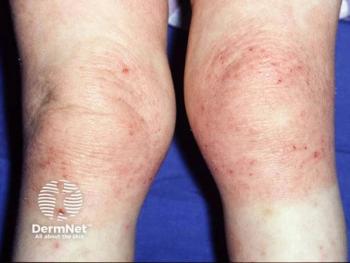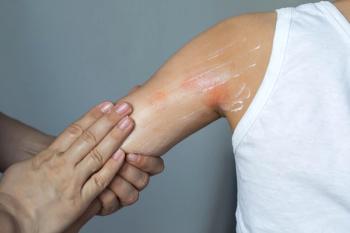
Optimizing management of atopic dermatitis
Dr. Lawrence Eichenfield discusses a better understanding of disease pathogenesis, available therapies and proactive treatment approach improves the outlook for managing atopic dermatitis.
The news is good for today’s atopic dermatitis patients and the dermatologists who treat them, according to Lawrence Eichenfield, M.D., who co-directed the Atopic Dermatitis panel and spoke on topicals for atopic dermatitis Saturday, March 2, at the 2019 American Academy of Dermatology (AAD) Annual Meeting in Washington, DC.
“We are amidst a revolution in atopic dermatitis - in our understanding of disease pathogenesis and mediators, the disease impact on individuals and families and associated comorbidities and in the therapies we have available to manage it,” says Dr. Eichenfield, chief of pediatric and adolescent dermatology at Rady Children's Hospital-San Diego and vice chair of dermatology and professor of dermatology and pediatrics at UC San Diego School of Medicine. “In the therapeutic arena, while we are thrilled with the introduction of systemic therapies, including biologic agents and small molecules such as the Janus kinase (JAK) inhibitors, we recognize that most atopic dermatitis can be well managed with topical agents.”
Optimal atopic dermatitis management is evolving as dermatologists emphasize effective control of dermatitis and itch - not just during flares, but across timepoints to minimize eczematous rashes, itch, sleep disturbance and secondary complications, according to Dr. Eichenfield.
Among the key takeaways from Dr. Eichenfield’s AAD talk:
- “We have expanded studies and experience with topical Crisaborole, and new algorithms in the literature incorporating newer medications in regimens of care.”
- “We have a set of non-steroidal [topical] agents in development that are novel and exciting and are well along the way of study in both pediatric patients and adults. These include topical JAK inhibitors (delgocitinib), ruxolitinib, Phosphodiesterase- (PDE-) 4 inhibitors and other novel agents, including tapinarof.”
- “Several products based on mediation of microbiome are fascinating and exciting, approaching management of atopic dermatitis by using ‘microbial therapy’ or ‘microbial probiotic transplants’ to mediate the dysbiosis of atopic dermatitis and clinical signs and symptoms of atopic dermatitis.”
- “And there are more coming, including synthetic cannabinoids and other targets for topical agents.”
Atopic dermatitis management is moving toward the approach taken with asthma, moving away from just reacting to flares to longer term treatment of the skin proactively to minimize active disease and symptoms, Dr. Eichenfield says.
Disclosures:
Dr. Eichenfield has consulting and/or research ties to Allergan, Anacor Pharmaceuticals, Cutanea Life Sciences, Dr. Reddy, DS Laboratories, Galderma Laboratories, Genentech, Kimberly Clark, LEO Pharma, Lilly, Medimetriks Pharmaceuticals, Novan, Otsuka Pharmaceutical Co., Pfizer, Tioga Pharmaceuticals, TopMD, Ralexar Therapeutics, Sanofi-Regeneron, Valeant Pharmaceuticals International and Valeant Pharmaceuticals North America.
Newsletter
Like what you’re reading? Subscribe to Dermatology Times for weekly updates on therapies, innovations, and real-world practice tips.










